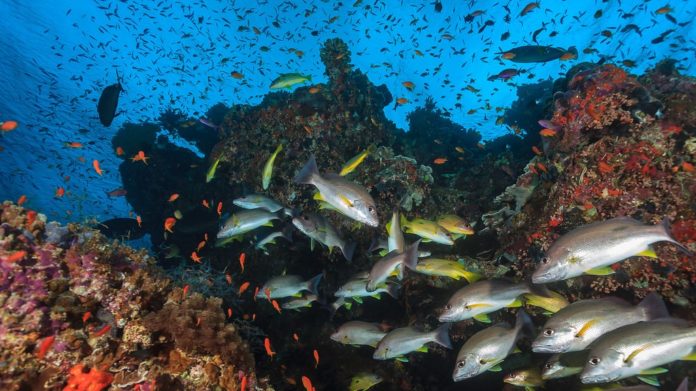Ocean acidification is driving a lot of odd behaviour among tropical fish living in coral reefs, according to multiple high profile studies over the last decade. But these findings may have been misguided, drawing attention away from real threats to these ecosystems, according to new research by Canadian and international researchers.
As levels of CO2 dissolved from air pollution increase in our oceans, thereby making them more acidic, coral fish are reportedly engaging in self-destructive behaviours. These include attraction to predators, altered activity levels, and sensory issues. The new paper was unable to replicate the findings of the previous studies that made these claims.
“[C]ontrary to previous studies, we have demonstrated that end-of-century CO2 levels have a negligible impact on the behaviour and sensory systems of coral reef fish,” said lead author Timothy Clark to Maritime Executive.
By 2100, CO2 levels in our oceans will be the highest they have been in over 20 million years. The NOAA has previously reported that our oceans sucked up around 31% of CO2 emissions between 1994-2007, amounting to around 31 billion metric tonnes.
Researchers confident findings can be replicated easily
The team used over 900 individual fish from six species (some were wild while others were sourced from aquariums) and studied them across the three years. The fish were first acclimated to varying levels of CO2-induced acidification for a minimum of four days. The researchers acknowledged this length was short, but it was nonetheless chosen because previous research suggests it is “sufficient to maximize behavioural and/or sensory impairments in fishes,” according to the paper.
The fish were then exposed to behavioural stimuli like chemicals that tell the fish a predator is near or an obstacle to overcome.
The team found “negligible effects” on factors such as predator avoidance, behavioural lateralization (a tendency to prefer one side of the brain during activity), and activity levels.
The study was designed to match the species, life stages, locations, and seasons of the studies they were challenging. Co-author Frederik Jutfelt commented to Cosmos Magazine that there were several inconsistencies in the study design of the original reports which the team aimed to make up for in this new study.
The researchers documented their work with video and left the raw data available for the sake of transparency, noting that they welcome attempts to replicate their findings or challenge their work: “if any readers are not convinced by our study then we would welcome collaborations so that other scientists can see the same results with their own eyes,” says Clark.
Ocean acidification aside, threats remain for coral fish
Even though the news is positive, the authors were quick to emphasize they are not trying to downplay the destructive effects of ocean acidification. It’s a major problem for creatures that rely on calcium carbonate to make their skeletons and shells — especially those on coral reefs — while the surging temperatures lead to coral bleaching.
“We believe that there are much greater threats facing coral reef fish,” added Clark, “such as ocean warming, habitat destruction and pollution, and thus these factors deserve more of our research attention with a goal to conserve coral reefs and all the wildlife they support.”








































